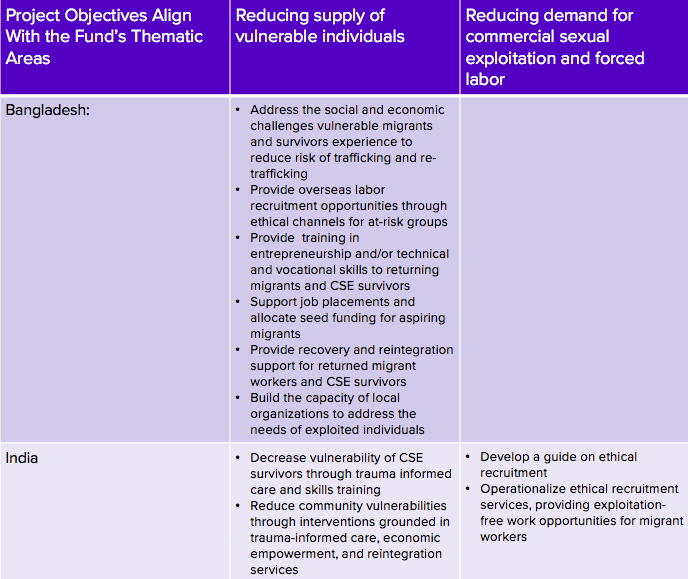With Norad, GFEMS launches six new projects
With Norad, GFEMS launches six new projects
July 2, 2020
GFEMS is proud to launch a new portfolio of interventions and innovations with funding from the Norwegian Agency for Development Corporation (Norad). The portfolio represents a 5.7M USD investment in programming, with additional programming to be added later this year, and will support recovery, reintegration, and rehabilitation of survivors, as well as build safer migration systems for migrants seeking work abroad, their families, and their communities in India and Bangladesh. GFEMS is funding six projects across these focus areas, in partnership with five local, regional, and international organizations. Projects in the Norad portfolio represent an investment in evidence-based, inclusive, and sustainable interventions.
This portfolio marks a new round of in-region projects for GFEMS, following the inaugural portfolio launch in late 2018. The portfolio projects have high potential to reduce vulnerability to trafficking and re-trafficking, informed by an extensive scoping and design phase that included research into structural drivers of modern slavery, vulnerability analyses of target populations, and industry analysis in priority sectors and geographies.
GFEMS and its partners designed the portfolio to address the Fund’s strategic priorities in Commercial Sexual Exploitation (CSE) and Ethical Recruitment. Specifically, the projects test new models of ethical recruitment and support growth of existing promising models for survivor care.
GFEMS views modern slavery through an economic lens as a systemic problem driven by traffickers’ exploitation of people for profit: a consistent supply of vulnerable individuals and demand for cheap goods and services. For example, within ethical recruitment, the Fund is lowering the supply of vulnerable workers by providing support to aspiring migrant laborers and making tools for the recruitment journey more accessible, and decreasing the demand for slavery by creating incentives for ethical labor over exploitive recruitment practices. Similarly, within CSE, the Fund is working to reduce the supply of vulnerable individuals through provision of trauma informed care, economic empowerment, and reintegration services. h The Fund ensures that all stakeholders, including the private sector, work together to address modern slavery and the systems on which it relies.

Sustainability is a key priority across the projects and across the Fund’s wider portfolio. GFEMS identifies projects that leverage national priorities and meet market demands, both indicators of high potential for replication and scale. Projects provide vulnerable populations and survivors with the skills and resources they need to live safe and full lives. Within the Norad partnership, GFEMS specifically seeks to support sustainable change in the recruitment industry and provide sustainable livelihoods for survivors of modern slavery.
In the coming weeks, GFEMS is excited to share more information about the projects and partners in this portfolio. The Fund looks forward to sharing the successes and lessons learned as the projects move forward.
Subscribe to the Fund’s newsletter and Medium page and follow us on Twitter to stay updated with the latest GFEMS activity.